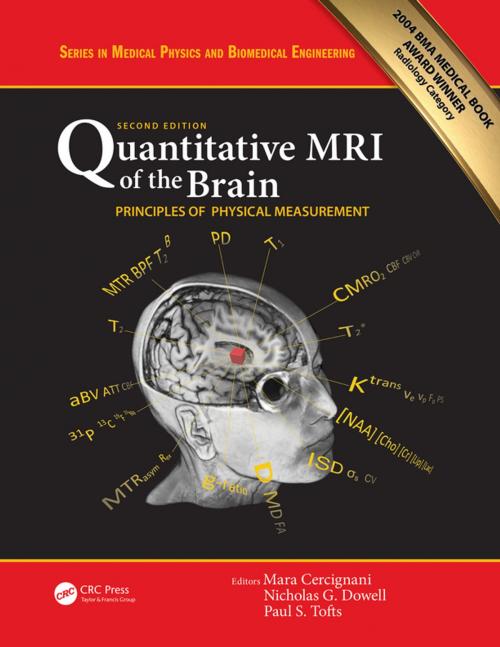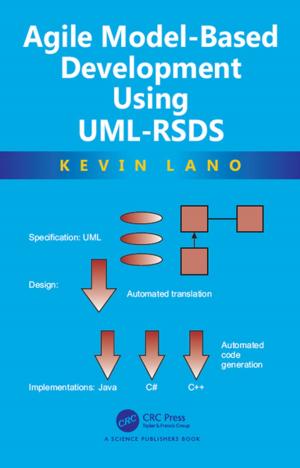Quantitative MRI of the Brain
Principles of Physical Measurement, Second edition
Nonfiction, Health & Well Being, Medical, Medical Science, Biotechnology, Science & Nature, Science, Physics, General Physics, Technology, Engineering| Author: | ISBN: | 9781315363554 | |
| Publisher: | CRC Press | Publication: | January 12, 2018 |
| Imprint: | CRC Press | Language: | English |
| Author: | |
| ISBN: | 9781315363554 |
| Publisher: | CRC Press |
| Publication: | January 12, 2018 |
| Imprint: | CRC Press |
| Language: | English |
Building on the success of the first edition of this book, the winner of the 2004 British Medical Association Radiology Medical Book Competition, Quantitative MRI of the Brain: Principles of Physical Measurement gives a unique view on how to use an MRI machine in a new way. Used as a scientific instrument it can make measurements of a myriad of physical and biological quantities in the human brain and body. For each small tissue voxel, non-invasive information monitors how tissue changes with disease and responds to treatment.
The book opens with a detailed exposition of the principles of good practice in quantification, including fundamental concepts, quality assurance, MR data collection and analysis and improved study statistical power through minimised instrumental variation. There follow chapters on 14 specific groups of quantities: proton density, T1, T2, T2*, diffusion, advanced diffusion, magnetisation transfer, CEST, 1H and multi-nuclear spectroscopy, DCE-MRI, quantitative fMRI, arterial spin-labelling and image analysis, and finally a chapter on the future of quantification. The physical principles behind each quantity are stated, followed by its biological significance. Practical techniques for measurement are given, along with pitfalls and examples of clinical applications.
This second edition of this indispensable 'how to' manual of quantitative MR shows the MRI physicist and research clinician how to implement these techniques on an MRI scanner to understand more about the biological processes in the patient and physiological changes in healthy controls. Although focussed on the brain, most techniques are applicable to characterising tissue in the whole body.
This book is essential reading for anyone who wants to use the gamut of modern quantitative MRI methods to measure the effects of disease, its progression, and its response to treatment.
Features:
- The first edition was awarded the book prize for Radiology by the British Medical Association in 2004
- Written by an authority in the field: Professor Tofts has an international reputation for quantification in MRI
- Gives specific ‘how to’ information for implementation of MRI measurement sequence techniques
Building on the success of the first edition of this book, the winner of the 2004 British Medical Association Radiology Medical Book Competition, Quantitative MRI of the Brain: Principles of Physical Measurement gives a unique view on how to use an MRI machine in a new way. Used as a scientific instrument it can make measurements of a myriad of physical and biological quantities in the human brain and body. For each small tissue voxel, non-invasive information monitors how tissue changes with disease and responds to treatment.
The book opens with a detailed exposition of the principles of good practice in quantification, including fundamental concepts, quality assurance, MR data collection and analysis and improved study statistical power through minimised instrumental variation. There follow chapters on 14 specific groups of quantities: proton density, T1, T2, T2*, diffusion, advanced diffusion, magnetisation transfer, CEST, 1H and multi-nuclear spectroscopy, DCE-MRI, quantitative fMRI, arterial spin-labelling and image analysis, and finally a chapter on the future of quantification. The physical principles behind each quantity are stated, followed by its biological significance. Practical techniques for measurement are given, along with pitfalls and examples of clinical applications.
This second edition of this indispensable 'how to' manual of quantitative MR shows the MRI physicist and research clinician how to implement these techniques on an MRI scanner to understand more about the biological processes in the patient and physiological changes in healthy controls. Although focussed on the brain, most techniques are applicable to characterising tissue in the whole body.
This book is essential reading for anyone who wants to use the gamut of modern quantitative MRI methods to measure the effects of disease, its progression, and its response to treatment.
Features:
- The first edition was awarded the book prize for Radiology by the British Medical Association in 2004
- Written by an authority in the field: Professor Tofts has an international reputation for quantification in MRI
- Gives specific ‘how to’ information for implementation of MRI measurement sequence techniques















